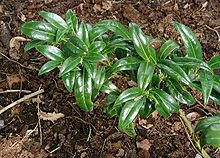Sarcococca
Appearance
| Sarcococca | |
|---|---|

| |
| Sarcococca humilis | |
| Scientific classification | |
| Kingdom: | Plantae |
| Clade: | Tracheophytes |
| Clade: | Angiosperms |
| Clade: | Eudicots |
| Order: | Buxales |
| Family: | Buxaceae |
| Genus: | Sarcococca Lindl. |
| Species | |
|
See text | |
Sarcococca (sweet box or Christmas box)[1][2] is a genus of 11 species of flowering plants in the box family Buxaceae, native to eastern and southeastern Asia and the Himalayas. They are slow-growing, monoecious, evergreen shrubs 1–2 m (3–7 ft) tall. The leaves are borne alternately, 3–12 cm long and 1–4 cm broad.
The plants bear fragrant white flowers, often in winter. The fruit is a red or black drupe containing 1–3 seeds. Some species are cultivated as groundcover or low hedging in moist, shady areas.[3] The basic chromosome number for genus is 14 (2n = 28).[4]
The genus name Sarcococca comes from the Greek σάρξ (sárx) and κόκκος (kókkos) for "fleshy berry", referring to the black fruit.[5]
Selected species
[edit]- Sarcococca confusa Sealy – Sweet box
- Sarcococca hookeriana Baill.
- Sarcococca humilis Stapf
- Sarcococca longifolia M. Cheng
- Sarcococca longipetiolata M. Cheng
- Sarcococca orientalis C. Y. Wu
- Sarcococca pruniformis (Saracodine courier)
- Sarcococca ruscifolia Stapf
- Sarcococca saligna (D. Don) Mull.-Arg.
- Sarcococca vagans Stapf
- Sarcococca wallichii Stapf
- Sarcococca zeylanica Baill.
References
[edit]- ^ The Plant List: http://www.theplantlist.org/tpl1.1/search?q=sarcococca
- ^ Hilliers Manual of Trees and Shrubs, Redwood Burn, 1998
- ^ RHS A-Z encyclopedia of garden plants. United Kingdom: Dorling Kindersley. 2008. p. 1136. ISBN 978-1-4053-3296-5.
- ^ Kubitzki, Klaus (2007). The Families and Genera of Vascular Plants. Vol. 9. Flowering Plants. Eudicots: Berberidopsidales, Buxales, Crossosomatales, Fabales p.p., Geraniales, Gunnerales, Myrtales p.p., Proteales, Saxifragales, Vitales, Zygophyllales, Clusiaceae Alliance, Passifloraceae Alliance, Dilleniaceae, Huaceae, Picramniaceae, Sabiaceae. Springer Science & Business Media. p. 43. ISBN 978-3540322191.
For Sarcococca, diploids with 2n=28 (less frequently, tetraploids) are recorded.
- ^ Coombes, Allen J. (2012). The A to Z of plant names. USA: Timber Press. pp. 312. ISBN 978-1-60469-196-2.
